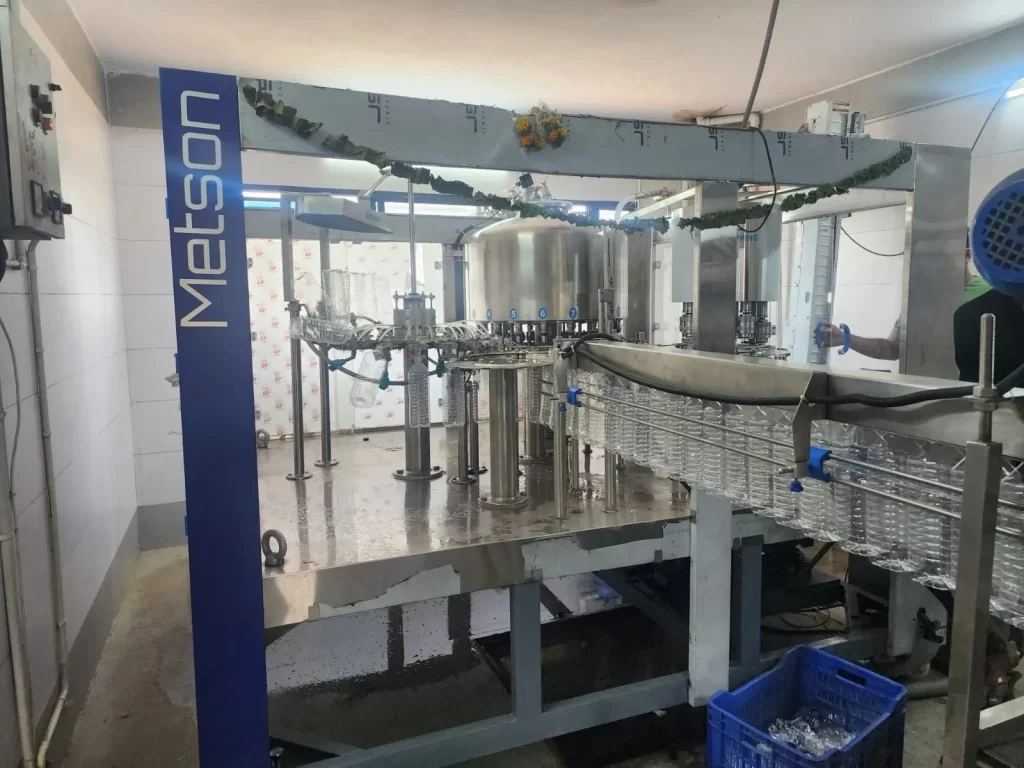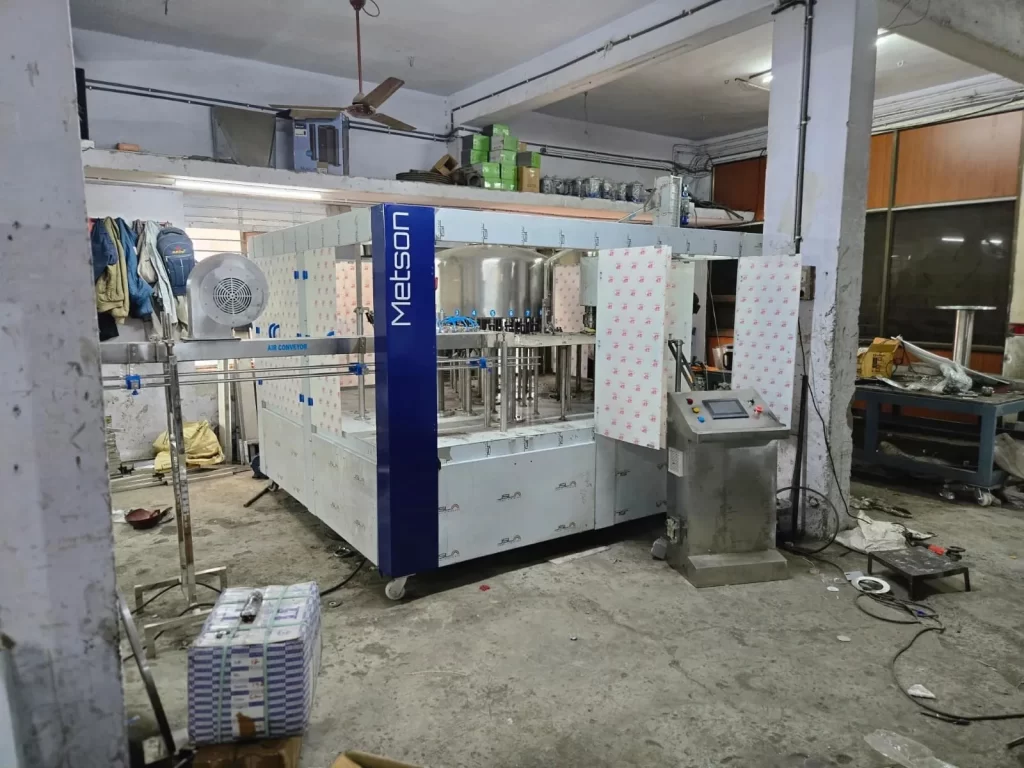The demand for safe drinking water is increasing every year, making small mineral water plants a highly attractive business opportunity. A small-scale bottled water plant with a capacity of 500–2,000 LPH is ideal for entrepreneurs, schools, hostels, and community projects. These plants provide a cost-effective and efficient way to produce bottled water, jars, and other packaging formats, while ensuring BIS certification and FSSAI compliance.
At Metson Machines, we specialize in turnkey mineral water plant solutions, offering comprehensive support from design and installation to on-site training and AMC services. Our small-scale RO plants are engineered for long-term reliability, energy efficiency, and operational ease, helping businesses and institutions deliver safe, high-quality drinking water consistently.
Understanding Small-Scale RO Plants and Production Capacities
Small-scale RO plants are designed to produce anywhere from 500 to 2,000 liters per hour, making them suitable for moderate-scale water production. For example, a 1,000 LPH small water bottling plant can produce 8,000–10,000 500ml bottles per day, enough to serve schools, hostels, or local retail markets. A 1,500 LPH water plant can produce around 15,000–18,000 bottles weekly, generating steady revenue while keeping operational costs low.
| Plant Type | Capacity (LPH) | Bottle Sizes | Ideal Users | Investment Range |
|---|---|---|---|---|
| Small-Scale RO Plant | 500–2,000 | 200ml, 500ml, 1L, 2L bottles, 20L jars | Entrepreneurs, schools, hostels, small retail | ₹3–8 Lakhs |
| Modular Upgrade | 2,000–3,000 | Same | Growing businesses | ₹8–12 Lakhs |
Example: A small-scale bottled water plant producing 1,000 LPH can supply 10,000 bottles/day, sufficient for small towns, institutions, or local distribution networks.
Why Invest in a Small Water Bottling Plant
Investing in a small mineral water plant is strategic for businesses seeking low-risk, high-return opportunities. Small-scale plants require lower capital investment compared to medium or large-scale plants and can be scaled modularly as demand increases.
A small-scale RO plant operates semi-automatically or fully automatically, ensuring minimal technical intervention. Energy-efficient systems make them suitable for areas with intermittent electricity supply, while food-grade stainless steel construction guarantees durability and hygiene.
By producing both bottled water and 20L jars, a small-scale water bottling plant can cater to multiple market segments, from retail consumers to institutions, generating steady income with minimal operational risk.
Technical Features of a Small-Scale RO Water Plant
A small-scale RO plant combines advanced purification technologies with robust construction to ensure high-quality output.
-
Multi-stage RO + UV purification removes dissolved impurities, bacteria, and pathogens.
-
Optional Ozonation and Mineral Rebalancing improve taste and maintain essential minerals.
-
Food-grade stainless steel (SS-304/316) ensures hygiene and long-term durability.
-
Semi-automatic control panels allow easy monitoring, with alerts for low pressure, filter changes, or power fluctuations.
-
Low power consumption ensures cost-efficient operations, even in areas with unstable electricity.
Applications of Small-Scale Mineral Water Plants
A small-scale bottled water plant is versatile and can be applied across multiple sectors:
-
Educational Institutions: Schools and colleges can provide safe drinking water to students and staff.
-
Hostels and Offices: On-site water supply ensures convenience and reduces dependency on external vendors.
-
Community Projects: NGOs and rural projects can supply clean drinking water in underserved areas.
-
Small Retail Bottlers: Entrepreneurs can produce bottled water for local markets efficiently.
-
Event Management: Temporary bulk supply for catering, festivals, and conferences.
Example: A 1,500 LPH small-scale water bottling plant installed in a hostel can produce 15,000–18,000 bottles/week, meeting daily consumption requirements reliably.
Investment, Costs, and ROI for Small Mineral Water Plants
Investing in a small-scale mineral water plant is financially attractive. The following table summarizes typical costs, production, and revenue:
| Parameter | Small-Scale RO Plant (500–2,000 LPH) |
|---|---|
| Initial Investment | ₹3–8 Lakhs |
| Operating Cost | ₹15,000–₹40,000/month (electricity, labor, maintenance) |
| Bottles per Day | 8,000–20,000 (500ml bottles) |
| Selling Price per Bottle | ₹10–₹15 |
| Expected Monthly Revenue | ₹80,000–₹3,00,000 |
| ROI | 12–18 months |
Even conservative projections indicate that a small water bottling plant can generate steady revenue, while modular expansion allows growth as market demand increases.
Operational Considerations for Small-Scale Bottled Water Plants
Several factors impact smooth operations of a small-scale RO water plant:
-
Water Quality: Conduct thorough testing for iron, fluoride, arsenic, and microbial contamination. Pre-treatment may be required for optimum performance.
-
Space Requirements: Small plants require minimal footprint, suitable for schools, hostels, or small warehouses.
-
Power Supply: Stable electricity is ideal, but energy-efficient plants can operate in areas with voltage fluctuations.
-
Staff Training: Minimal training is required; suppliers often provide on-site training and AMC support.
-
Maintenance: Periodic replacement of filters, membranes, and spare parts is essential for consistent water quality.
Frequently Asked Questions about Small Mineral Water Plants
Can a small-scale plant produce both bottles and 20L jars?
Yes. Many small-scale plants are versatile enough to produce both, though dedicated jar-filling lines may be needed for higher-volume jar production.
What is the typical ROI for a small mineral water plant?
ROI is usually achieved within 12–18 months, depending on local demand and operational efficiency.
Are these plants BIS & FSSAI certified?
Yes. Every small-scale plant is designed to comply with BIS and FSSAI standards, ensuring safe and legal operations.
Can the plant be upgraded in the future?
Absolutely. Modular designs allow additional RO units, automation, or bottling lines to increase capacity as demand grows.
How much maintenance is required?
Maintenance is minimal. Regular filter and membrane replacement is sufficient, and AMC support ensures uninterrupted operation.
Conclusion
A small-scale mineral water plant (500–2,000 LPH) offers a perfect balance of affordability, scalability, and profitability. It is ideal for entrepreneurs, educational institutions, hostels, and community projects aiming to provide safe, high-quality drinking water.
By investing in a BIS-certified small water bottling plant, businesses can establish a strong market presence, generate steady revenue, and scale operations over time. At Metson Machines, we provide complete turnkey mineral water plant solutions, including design, installation, training, and AMC support, ensuring that your small-scale RO plant delivers safe, certified water reliably.
Contact us today to learn how a small-scale mineral water plant can transform your business opportunity into a profitable venture.



